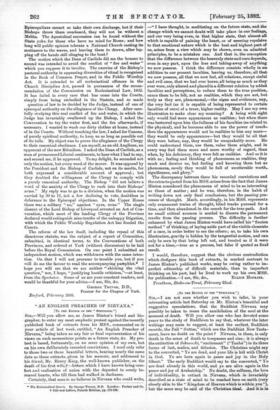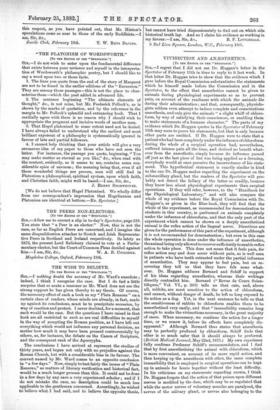LTO THE EDITOR OF THE " SPECTATOR." J Snt,--I am
not sure whether you wish to infer, in your- interesting article last Saturday on Mr. Hinton's beautiful and suggestive speculations, that the Buddhist Nirvana may possibly be taken to mean the annihilation of the soul at the- moment of death. Will you allow one who has devoted some, years to the study of Buddhism to say that, whatever the later writings may seem to suggest, at least the earliest Buddhist records, the Pali " Suttas," which are the Buddhist New Testa- ment, leave no doubt on the point P Nirvana, in them, is only death in the sense of death to trespasses and sins ; it is always the extinction of Sehneucht, "excitement" ("Tanhi") in its three forms of lust, malice, and delusion. The Christian might say to the converted, "Ye are dead, and your life is hid with Christ in God. Ye are born again to peace and joy in the Holy Ghost." The early Buddhist would say to the converted, " Ye are dead already in this world, and ye are alive again in the peace and joy of Arahatship." No doubt, the selfness, the love of individuality, is extinct in Nirvana, which is invariably described as a state of mind to be reached here on earth (very closely akin to the " Kingdom of Heaven which is within you "), but the same may be said of the Christian ideal. And it is in
this respect, as you have speculations come so near to am, Sir, &c.,
pointed out, that Mr. Hinton's those of the early Buddhists.—I Basile Club, February 19t h. T. W. Rays DAVIDS.



































 Previous page
Previous page